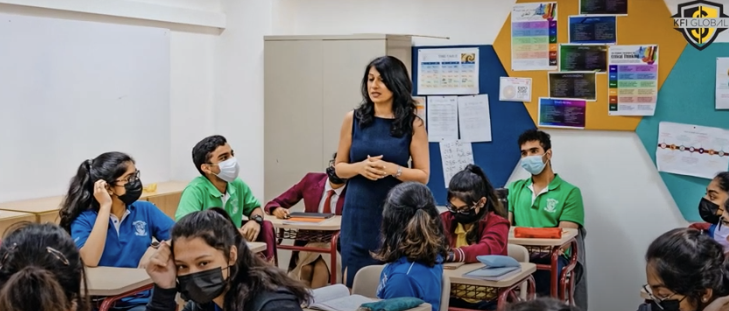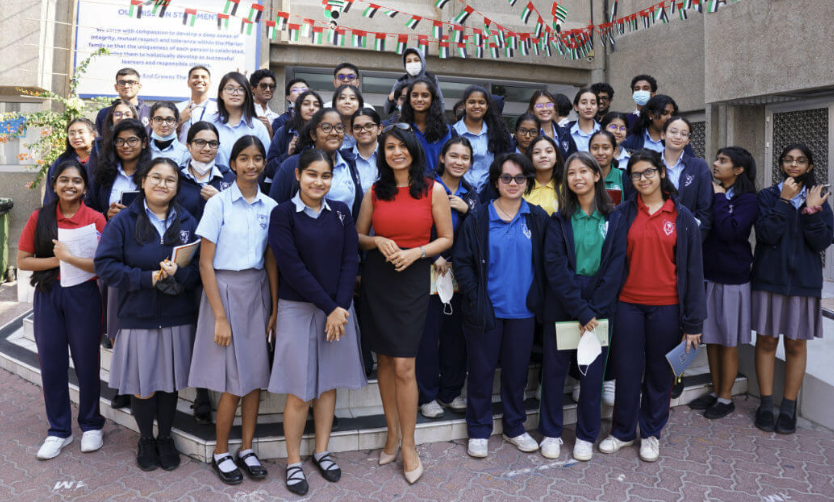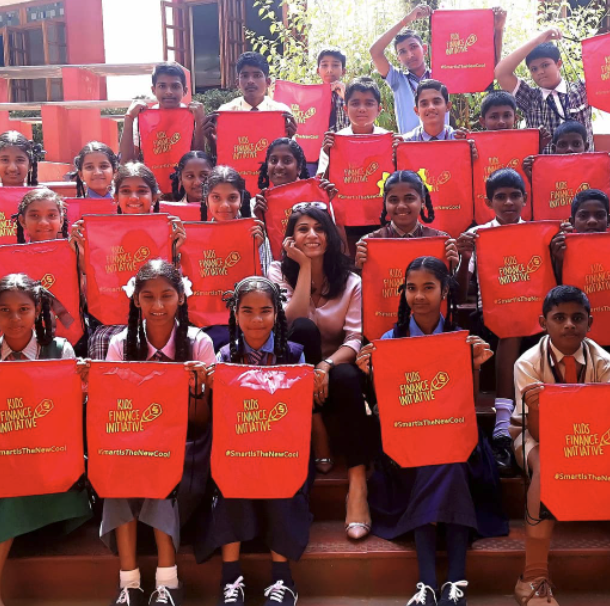Marilyn Pinto is the founder of KFI Global, an organization based in the UAE, which has been educating kids and teenagers for the past 5 years about the importance of proper management of their personal finances. More than 5,500 students have gone through the KFI (Kids Finance Initiative) financial empowerment programme and are setting themselves up for a financially secure future. Marilyn works with some of the most respected educational and financial institutions to bring this critical education to more teens across the world. She is on a mission to empower more teenagers with this skill because she believes this will help them step up, stand out and live life on their own terms. Recently, Marilyn released her book “Smarter, Richer, Braver” – “Unleash the power of financial education and turbocharge your teen’s future.” The book aims to enlighten parents about the importance of making their teenage children financially literate, the importance of inculcating good financial habits in their teens from a very young age and what can they do to empower their teens to take control of their finances and make wise decisions about how to use their money when they grow up.
In a brief tete-a-tete with our staff writer Steve Antao, Marilyn shared some insights into her life, the journey of the KFI Global, her book Smarter, Richer, Braver, and much more…
Excerpts
Steve: Tell us a little bit about yourself.
Marilyn: I am from Panjim. I was born in Kuwait where I did my primary schooling. I then returned to Goa to do my secondary schooling at Mary Immaculate Girls High School. After completing my higher secondary education in Science at Dhempe College, Panjim, I pursued my B.Sc in Biochemistry at St. Xavier’s College in Mapusa. My first job was at AT&T where I worked for close to 4 years after which I joined Coca-Cola in Pune. I worked there for a year and then went to the UK to pursue my MBA from the prestigious London School of Commerce
Steve: When did you migrate to the UAE?
Marilyn: Almost 20 years ago. I wanted to stay here for a couple of years only, but this place really grows on you.
Steve: What inspired you to start the Kids Finance Initiative (KFI) Global?
Marilyn: That’s easy… My kids! I didn’t start this company because I noticed a gap in the market. I started it because I noticed a gap (more like a deep gaping hole) in my then eight- and ten-year-old daughters’ understanding of money. While they were both academically brilliant, they were clueless about money, and this problem wasn’t specific to them. Everybody else’s kids seemed to have the same issue.
I didn’t intend to start a company. I just wanted to enrol my kids in a programme that taught them about money in a thoughtful, holistic and intelligent way. There wasn’t one back then. I knew what I wanted, and every programme I looked into came up way short.
There seemed to be a lot of half-hearted and short-sighted attempts to bring about change in this domain, but those petered out quickly due to many reasons, chief among them being a lack of proper understanding of the underlying problem and an unimaginative way of trying to fix it.
Just telling teens what to do made little difference if they didn’t properly grasp how important this was and how this would drastically affect their lives. Many of the financial education programmes available back then were deeply flawed too, at least with respect to garnering interest from teenagers. All of this was just the tip of the iceberg that I was heading towards at full steam.
That’s how and why I started KFI. It’s a labour of love, created not just for my kids but for any kid who’d like to be financially empowered.
Steve: Take us through the journey of KFI Global, from its inception till today.
Marilyn: KFI started almost 5 years ago. And it has evolved so much in every way; in what we teach, how we teach and even who we teach. We started with a focus on 8 to 10-year-old kids, but today we teach students ranging from 10 years to 24 years of age. We started with students in the UAE but today, we have students from all over the world who join our programs through the online classes we conduct.
But perhaps the biggest evolution has taken place in how and what we teach. In addition to personal finance, we incorporate facets of psychology, neuroscience, decision making and emotional intelligence in our programs. We have also increased the programs we run – Smart Money Management, Investing, Entrepreneurship and SUPERMIND, which is a program that teaches students ‘how’ to learn.

Steve: What were the challenges that you faced while starting this initiative? And how did you overcome them?
Marilyn: I’d like to split my answer to this question in two parts – Personal Challenges and Business Challenges.
Personal Challenges
For a long while, I was stuck on the ‘who am I to try?’ question. Who was I to question the education-industrial complex and tell academics and tenured professors that what they aren’t teaching our teens about money is severely handicapping their ability to live up to their full potential? Who was I to tell other parents that this is an issue that needs their immediate, undivided attention? Who was I to tell financial industry experts that what they do by helping people better manage their finances needs to happen earlier?
A potent mix of imposter syndrome, a lack of experience and confidence, a terrifying fear of failing and useful excuses about time, money, kids and life kept me at the pondering and self-debating stage for longer than I care to admit. I’m an introvert. I grew up with a pronounced stutter that effectively took any sort of public speaking off the table. The thought of giving a speech was enough to make me want to throw up. I hated being in the spotlight, which I understood would be a requirement here. I had young kids who needed me. My husband and I were already running a business together.
There seemed to be tons of people out there who were more qualified and experienced than me. People who already had a huge social media following, who were in the education or financial services industry and for whom, it seemed to me, it would be a short leap to embark on this crusade and make a success of it.
I had built a watertight case about the futility of going down this path. The twenty-four-carat excuses I had dreamt up for myself were unassailable. Nobody could blame me for ditching this idea. Except an annoying voice inside my head that refused to shut up: ‘If they are so experienced and knowledgeable, why is this issue largely unaddressed in society?’
It took a while for me to get to the stage where I could ask myself ‘Who am I not to try?’ and have a reasonable answer. I hadn’t had any sort of financial education growing up, so I keenly felt this lack of what I came to realize was an essential life skill. I had kids who I wanted to make sure were not going to follow in my footsteps and make ludicrous money mistakes, whether by commission or omission.
I was a quick study and had a knack for explaining complex concepts simply and memorably.
I saw vividly that this issue had the potential to derail lives if not addressed early on. I certainly cared enough to spend every waking moment obsessing about the best way to approach this and effect lasting change. I realized that I didn’t need to be in the spotlight. I just needed to shine the spotlight on this critical issue. I had kids who needed to see me stand up for what I believed in, and to strive for significance and impact, as I hoped they would someday. I had the unstinting support of my husband, who I call my delusional angel (someone who believes in you without any good reason). Tell me again, I asked my stubborn self: ‘Who am I not to try?’
Business Challenges
I think my biggest challenge arose from the fact that I wasn’t gushing with ‘cruel optimism’. ‘Cruel optimism’ was first coined by the historian Lauren Berlant. This is when you take a big problem with deep systemic causes in society — like obesity, stress, or financial illiteracy — and offer a simplistic solution in an upbeat manner.
It’s optimistic because it implies there is a quick and easy solution to this complex problem.
It’s cruel because the solution offered is very limited, not to mention short-sighted, and does not take into account the deeper causes of the problem and so will fail to work for most people.
I refuse to offer ‘3 quick tips’ or byte-sized advice and recommendations. And that seemed to be exactly what the market was looking for. Nobody was interested in the underlying causes or a long term solution. It needed to be snappy and cute. I don’t do either.
I was offering authentic optimism. This is where you identify and carefully study the deep-rooted causes and the obstacles you’re likely to encounter and then lay out a plan to overcome those obstacles. This necessitates genuine concern and long-term thinking, which isn’t easy to come by.
We also made it abundantly clear to all prospective financial institutions who were interested in partnering with us that we would never be advertising or selling their products to the kids in our care. That was a deal-breaker and it did indeed scuttle many deals.
However, I’ve been very fortunate to partner with some of the leading financial institutions here in the UAE like Dubai Islamic Bank, Emirates NBD and National Bonds who’ve wholeheartedly supported us and our vision. I am so grateful to them because they really helped us scale this initiative by sponsoring this program in schools across the UAE.
Steve: What was the response of the public towards KFI when it just started?
Marilyn: When I started this initiative 5 years ago, there wasn’t much of an awareness of financial education. Parents just assumed their kids would learn everything they needed to be successful in at school because schools were shouting from the rooftop about how innovative, and future-ready their curriculum was. So we had to spend a lot of time educating the public about the issue of financial literacy and how this was very different to what was covered in an economics or business class.
And again, I come back to the point of ‘cruel optimism’, which I wasn’t offering. The public was looking for a quick fix, a magic bullet. One session that would magically transform their kids into financial gurus. I don’t blame them because there were companies out there offering just that.
We refused to do one-hour classes – we only ever enrolled students for the entire financial program that was laid and built on solid foundations. We focused on changing attitudes and mindsets and on impacting behavior. The parents who enrolled their kids in our program were amazed at the results and at the mature understanding, their kids now seemed to have about money. I will always be grateful to those parents for trusting us with teaching their kids; their feedback and encouragement meant the world to me.

Steve: What are your future plans for KFI?
Marilyn: To scale this through a multi-stakeholder approach by working with financial institutions and educational institutions, and bring this crucial education to more teenagers across the world.
Steve: Do you intend to start providing your services to schools in India as well via video-conferencing apps like Zoom or Google Meet?
Marilyn: We actually did conduct an initiative in 2020, just before the pandemic hit, in collaboration with the Government of Goa and the Goa State Innovation Council, where we ran this program for 160 students from 80 schools in North and South Goa. I loved doing that and I hope we can work with the schools and the government to do more in Goa in the future.

Steve: Give us a brief idea regarding what your book “Smarter, Richer, Braver” is all about?
Marilyn: My book “Smarter, Richer, Braver” is aimed at parents of teenagers. It breaks down the issue of financial education – it gives the reader a deeper understanding of the problem, because I believe it’s important to understand the problem fully before we ever attempt to solve it.
It talks about the obstacles involved and gets parents to see the issue of financial education in a very different, more holistic light – one that then sets the stage for empowering their teens with this crucial life skill.
Steve: Finally, any message or words of advice that you would like to share with our readers, especially the youth?
Marilyn: “Wake up, it’s later than you think. Get yourself educated about money. Money is intricately entwined in every aspect of your adult life and the sooner you learn how to make smarter money decisions, the better off you will be.”
Note: The Kindle edition of Marilyn’s book Smarter, Richer, Braver will be available at a discounted rate of 99 cents (Rupees 50) during the one-day Kindle promotion on Amazon on the 21st of June 2022.
To order your copy of this wonderful book, click the link given below:
Smarter, Richer, Braver – “Unleash the power of financial education and turbocharge your teen’s future.”


